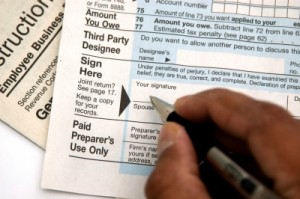According to an Internal Revenue Service report, the U.S. treasury was shorted $385 billion in tax receipts in 2006 alone due to, “underreporting and underpayment,” by U.S. taxpayers, both individual and corporate. The amount would be $65 billion higher but the IRS managed to collect that amount through audits and enforcement. IRS audits could be described as being akin to an extremely invasive and expensive financial physical. They can require costly legal assistance and cause extreme stress, and a dishonest taxpayer could find themselves facing huge penalties, interest, and even prison time.
Who Gets Picked for an Audit?

The best way to avoid an IRS audit is to be honest on your tax returns. If your returns are complicated in any way, a tax professional is worth the money. In the case of a small business owner or an independent contractor, you must be able to prove every penny of every deduction. You must have proof of everything.
The most common issues that lead to audits include under reporting income and the home business deduction. If you receive a 1099, the IRS receives a duplicate. If things don’t match up, you could trigger an audit of not only your current year’s taxes, but up to three years prior. They can audit up to six years prior if you are suspected of under reporting income by “25 percent or more.” A 2010 Denmark study found “that the tax evasion rate is very small (0.3%) for income subject to third-party reporting, but substantial (37%) for self-reported income.” The IRS is aware of these studies and have had similar results in their own studies, therefore, people who self report need to work extra hard to keep their records intact and their returns accurate.
The Penalties
The IRS is not in the business of punishing taxpayers that made a mistake. They understand that the tax code is complicated and things happen. They make a distinction between mistakes and deliberate fraud. As a matter of fact, fraud will get you a 75 percent penalty while a mistake will incur a 20 percent penalty. It is estimated that fewer than three thousand people are convicted yearly of tax fraud in American, but the financial and mental penalties of a bad audit can feel like a prison.
When you are selected for an audit you have to decide whether or not you will need a tax attorney. If your returns are complicated, you probably need a representative on your side through the process. If it is a simple request for information, provide the information to the IRS and hopefully the matter will be sorted out. An audit can feel like an intense invasion of privacy. Every taxpayer is wise to play by the rules and limit their chances of an IRS visit.
Image courtesy of Arvind Balaraman / FreeDigitalPhotos.net
See Also:
- Best States for Relocation with Regards to Income Tax
- A Tax Guide for the Self-Employed
- Understanding the Deduction for Charitable Donations
- Tax Deductions for New Parents

